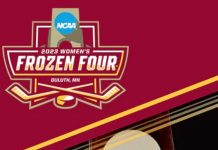Arlan: Senior Days are being celebrated, so we must be nearing the end of this regular season that has been anything but regular. What have we learned from it?
My interest in the sport doesn’t date back to its nascent days, but I’m guessing it was a little like this. Teams likely scheduled each other on short notice at times, and games may have been canceled due to a lack of players. I doubt anyone talked about the sport having parity. The effects of Covid have allowed the game to come full circle, but not in a good way.
Conferences have made plans to go ahead with their tournaments. The CHA will have a single-weekend tournament for all six teams, if the virus protocols allow, in Erie, Pa.
Hockey East is going to have a single-elimination tournament involving all of its teams, seeded based on the newly-devised Hockey East Power Index. If the HEPI is still around next season, then I’ll figure out how it works, but for now, let’s just say it has math and Northeastern sits atop the number-crunched heap. The event kicks off with a couple of elimination games on Feb. 24 to get down to eight teams for the quarterfinals. All games will be hosted on the campus of the higher seed.
The WCHA is limiting its tournament to the top four teams with semis and finals on March 6 and 7, respectively. There have been some complaints about the format that doesn’t include all teams. While I can understand that sentiment, the teams that figure to be eliminated have combined for only a single overtime win versus those that are on pace to advance.
ECAC Hockey didn’t have many options, given only four of its dozen teams chose to drop the puck this year. All four are slated to compete in semifinals hosted by the top seed on March 6, followed by a final the next day.
Does anything stand out to you about the postseason plans for these leagues?
Nicole: I absolutely do not do math. I prefer letters to numbers, so I’ll leave the HEPI and all other calculations to the pros.
I’ve been critical and skeptical of all kinds of things this season, but one thing I have never doubted is that the conferences and commissioners are doing the best they can with good intentions. They’re working under the premise that any hockey is better than no hockey and that playing the season is what their student-athletes told them they want. Under that premise, they’ve tried to play as many games as was smart and safe and are trying to create a post-season under the same guiding principles.
With that in mind, having fewer teams in the conference tournaments only makes sense. You mentioned the competitive justification for only inviting the top four teams, but it also puts 100 or so fewer people in the stadium. I’ve heard they’re considering not allowing any media in, as well. Their focus is getting to the end line and not further compromising any team’s ability to play in the NCAA tournament. In some ways it’s a little contradictory or oxymoronic, but if we accept the premise that play is happening, then this is the right way to do it.
In non-pandemic years, Hockey East and the ECAC only take a set number of teams to the postseason, so anything they do in that realm isn’t really unusual.
Honestly, I just can’t muster up a lot of feelings about the conference tournaments. I’ve been on record as not being sure sports should be happening. That’s really a moot point for college hockey at this point. The players put a ton on the line this year and risked so much. I guess I feel like at this point they can at least finish it out and for at least one team, they’ll feel like it was worth it?
Arlan: In the weeks after our last column, we’ve also had an NCAA announcement concerning plans for its national tournament. All three rounds, including the quarterfinals, will take place in Erie, the previously-announced site of the Frozen Four. As fans, it will be nice to have the option of watching all four of the first-round games, rather than the typical schedule where two or three are taking place simultaneously.
So while there has been an attempt to conduct business as usual, something that was impossible a year ago when the NCAA Tournament was canceled, I’d like to give a quick nod to those that we are missing this season. Namely, no Ivy League teams. While none have ever secured an NCAA Championship, Harvard did win one of the three national tournaments conducted before the NCAA took over the event. Beyond that, the Ivies have left their prints all over the tournament.
Of the six Ivy League teams, only Yale has never advanced to the NCAAs. Princeton and Cornell had qualified for the 2020 NCAA Tournament that never was. Prior to that, Ivy League teams reached 30 NCAA Tournaments, 15 semifinals, and six finals.
Plus, without them, the four ECAC teams that did play have struggled to find games. St. Lawrence got started playing less than a month ago, and then had to take a break due to contact with the virus. The Saints have played only six games, with just one win. Quinnipiac has taken the ice 13 times, but six of those were one-sided contests versus NEWHA teams. In an attempt to craft a schedule, Colgate and Clarkson met 10 times.
With the dissimilar schedules in that conference and around the country, do you have any insight into how the NCAA plans to select teams for its tournament bracket next month?
Nicole: My opinion is that most all of this is going to be decided from an eye test and I think the committee members will be relying strongly on the information and “scouting” they’ll hear from fellow coaches. The committee is comprised of coaches and this year more than any other they’ve not been able to see a lot of other teams play. My guess is each of the committee members will be talking to trusted staff in other conferences to fortify their knowledge.
I understand that might not be a very satisfying answer for people, but I think it’s important to remember that most of the processes and calculations that we use in a “regular” year are pretty much useless this season. Pairwise is imperfect with the smaller number of teams in women’s hockey anyway, but without inter-conference play, the tools we’re used to just can’t be counted on this year.
There really is no good answer for how the tournament should come together that will make everyone (or even a large percentage of people) happy. I’ve heard suggestions of two invitations per conference, but I personally don’t love that suggestion. I think both Colgate and Clarkson are probably tournament teams, but I also bristle a little at the idea of automatically awarding two bids to a four-team conference.
While I don’t want to lean on Pairwise, etc … I don’t think we should totally ignore rankings. At this point, they’re probably the best manifestation of a season-long eye test that we have. Over the years I’ve heard a number of coaches say they prefer or are more proud of a regular season conference title because it is the culmination of a season’s worth of work and is indicative of all the team did to get to that point. It’s that idea that sticks with me when it comes to picking a tournament field.
I think my preferred format would be one bid per conference and four at-large bids. It seems like the best way to ensure the tournament is truly the eight best teams in the country.
With all that said, in my model, Clarkson would be on the outside looking in. But looking at the top 8, I don’t know who I’d take out. I think the most controversial part of the tournament will be whether or not that WCHA should get four bids. If we’re talking about putting Clarkson in, I think either Minnesota or Minnesota Duluth is the team that would be switched out.
What’s your preferred tournament format? Do you think Clarkson is a tournament team? And if so, which team do you think shouldn’t be? And what are your feelings on whether Minnesota and/or Minnesota Duluth get in?
Arlan: My opinions here have been formed over many years of watching the commentary after the NCAA announces its selections for the men’s basketball tournament. There will always be some coach of a team that plays in a power conference and finished 16-14 lamenting the fact that his team didn’t get into the tournament. He’ll blame all of those automatic qualifiers. Dude, the problem is that your team lost 14 games; do we really need you in the Big Dance so that you can lose another one?
Very few teams should feel safe heading into their conference tournaments. Wisconsin. Northeastern. Those two are locks. For the rest, I can come up with a scenario that would make supporters of a given team feel uncomfortable.
Ohio State fans will be sure that the Buckeyes have to be in no matter what. Say that UMD wins the WCHA bid. Wisconsin is already in. What if Northeastern gets upset? Imagine that Providence defeats Boston College in the Hockey East final. All three of those HEA teams could be selected.
If the committee looks at RPI, then a team like Ohio State is vulnerable to Cinderella winning a conference tournament, as is always the case for teams sixth or lower in the PairWise Rankings. Colgate and Clarkson have strong positions based on computer rankings, but those are rankings built in large part through head-to-head records that tell us very little. If the committee goes by the eye test rather than the computers, then there are some mediocre results to consider. If Quinnipiac or St. Lawrence takes the ECAC, what do you do with Colgate and Clarkson and their very similar records? Take neither? Take both, and have three teams from a four-team league?
Penn State deserves to be in. However, if the Nittany Lions don’t win the CHA, will there still be an at-large spot waiting? Maybe. I hope so, but I’m not betting my money on it.
I think it is much more straightforward when it comes to teams like Minnesota-Duluth and Minnesota. If you want to advance, win the WCHA. If you don’t, I doubt that you’ll need to concern yourself with what the weather in Erie is like in March.
I don’t envy the committee, but I don’t think that they can fall too in love with any single conference. To the victor go the spoils. Give the spots to the teams that have shown a propensity for winning, particularly over opponents that can be shown to be strong this season. Not just traditionally.
Am I wrong?
Nicole: I’m pretty much always Team Mass Chaos, so I hope we get a lot of great tournaments and unforeseen outcomes. My hoping for upsets usually seems to ensure that things go perfectly to plan, however. The tournaments are ripe for some craziness in “regular” years, but I do think they’re particularly susceptible to some volatility this year.
You mention Wisconsin and Northeastern as locks for bids – and I agree – but I also think they’re both beatable in their respective tournaments. Both teams have improved quite a bit in the past few weeks, but they’ve also both had some stumbles. One side effect of the way this season played out is that some of these teams are super familiar with each other and know exactly what the weaknesses are and how to exploit them. In these one-and-done situations, one mistake can make all the difference.
There’s something a bit comforting in knowing that among all the other changes and upheaval this year, everything still comes down to “win and you’re in.”
Arlan: Much as it is more difficult to evaluate and compare teams this year, it is also challenging to put some context around the seasons that various athletes are producing. The USA Hockey Foundation plans to make a virtual presentation of the Patty Kazmaier Award in 2021.
What will it mean to win the Kazmaier in a season where Northeastern’s Alina Mueller is the only player to reach 30 points so far, and New Hampshire is the only team to have reached 20 games played? If Elizabeth Giguère or Daryl Watts adds a second Kazmaier to her resume, should she feel the same sense of accomplishment as she did in earning the same award for a campaign that was 50 percent longer?
I don’t know what schedule is planned for the Kazmaier this year, but given the dearth of games and the award’s virtual nature this time, I would hope that the process is conducted after the season is complete. That provides the best opportunity to give each body of work the consideration it deserves, without trying to time a ceremony with the Frozen Four when athletes are gathered together.
Or do you prefer trying to adhere to the usual schedule?
Nicole: Nah, I’m not at all tied to the Patty schedule. I think your suggestion makes the most sense this season as we’ve not been able to see inter-conference play. It would be nice to have that full sense of a players’ season and how they play in that pressure situation.
For me personally, I much prefer making those judgements after having seen a player live. Streams being what they are, it’s not always possible to really get a grasp on a player’s impact. I’m not a Patty voter this year, but I am tentatively hoping to be able to be in Erie for that whole week and that would carry a lot of weight in how I vote for postseason awards.
I agree with you that Mueller, Giguere and Watts are probably the front-runners, but I’d have a hard time not agreeing with any and all arguments someone could make about why one is more deserving than the other. The data is so incomplete. I absolutely believe Northeastern will fare well against other top teams, but I’d also like to see them and Mueller against tougher opponents before I make a full judgement.
My gut has me leaning towards Watts with her nearly two points per game, but I also have seen her more, so I try to temper how much that impacts me. And I think I’m giving her some “career credit,” as well. Obviously we all know how good she is, but I was still really surprised to learn she moved into 17th place on the all-time career points list with 231, passing Caroline Ouellette. That’s with a low-scoring (for her) sophomore outing of just 48 points and this year’s truncated season, where she has 27 points. She’ll finish in the top 20 of pretty much every scoring category. Those aren’t reasons to give her an award for this season, obviously, but I feel like she might not get credit for the total career she’s put together.
We announced here on USCHO that the Women’s Hockey Commissioners Association has created a Goalie of the Year Award. I feel like it’s probably Aerin Frankel’s award to lose this season, but there are a few other women who’ve stood out between the pipes this year. I’ve been very impressed with Emma Soderberg at Minnesota Duluth, who had the shadow of Maddie Rooney looming large and freshman Josie Bothun at Penn State, who has not played like a rookie.
I wrote a whole column last year on why I thought it was time for a women’s goalie award, so I’m obviously excited about it. What are your thoughts on the new award? Who do you think the award will eventually be named after? Do you think anyone other than Frankel is a likely winner?
Arlan: No. Frankel leads all four main stats for goalies. Plus, she has a strong reputation built over the course of her career. Best of all from my vantage point, she’s a senior. I realize that doesn’t rule out the possibility that she returns next year and is a contender for the award again, but for a new award, you certainly don’t want to get into the situation where you’re in its third year and you’ve only ever had one recipient. Although, I guess that would solve the question regarding who to name the award after.
On that note, do you think the award should be named after someone who personified goaltending excellence? If so, then I’d go with Jessie Vetter. Modern-day Badger fans will favor Ann-Renée Desbiens, but she never won a title, so that weakens her resume.
The other path to take with it is someone who has made major contributions off the ice. Perhaps someone involved with growing the game at the youth level.
I would like a story like that of former Northeastern goalie Chanda Gunn, who overcame epilepsy to star for the Huskies and become an Olympian. With the precedent of the Kazmaier and the Laura Hurd Award, it should be about more than just stopping pucks.
Nicole: Another name I’d throw into consideration is Ali Brewer, who was the third player to win the Patty Kaz and the first goalie. There’s also Noora Raty, who back-stopped Minnesota to their undefeated season, should probably also be in the conversation. She got overshadowed by talented teammates when it came to awards while she was in college and she’s been involved and vocal about getting equal support for women’s hockey on an international level.
I’m certain all these names are already in the conversation and we won’t find out until next year who the award is named for.


